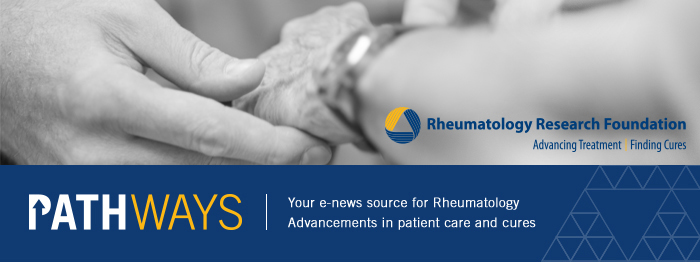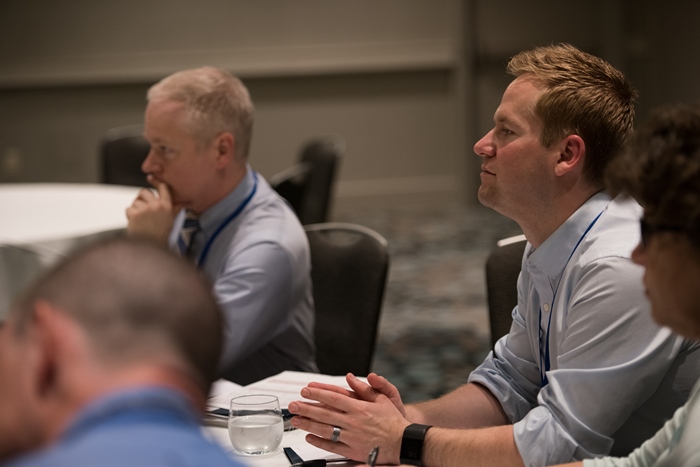Pathways

Volume 5 • Issue 10 • October 2016 • Rheumatology Research Foundation
Reducing Infections with New Data
|
 Jeffrey Sparks, MD, MMSc, joined fellow researchers in the field at the 2016 Investigator's Meeting in Atlanta, GA hosted by the Rheumatology Research Foundation. Updates in critical research for rheumatic disease were central to the meeting. Jeffrey Sparks, MD, MMSc, joined fellow researchers in the field at the 2016 Investigator's Meeting in Atlanta, GA hosted by the Rheumatology Research Foundation. Updates in critical research for rheumatic disease were central to the meeting.
|
Many patients with rheumatoid arthritis (RA) are at an increased risk of infection due to both the disease itself, and the immunosuppressants often prescribed to manage rheumatic diseases. While treatment can successfully regulate many aspects of the disease, understanding infection risk and its outcomes could lead to prevention of infections for those living with RA.
With funding from the Foundation’s Scientist Development Award, Jeffrey Sparks, MD, MMSc of Brigham and Women’s Hospital and Harvard Medical School is designing a robust method for investigating infection risk among RA patients. Dr. Sparks has created a novel dataset from the analysis of entire medical records in hopes of discovering possible risk factors.
“Our interest has been to identify and ultimately prevent serious infections using these methods and to look for predictors of serious infections, as well as to understand the outcomes—things like re-hospitalization, repeat infection, and mortality,” says Dr. Sparks.
Available data on infection risk in RA has been limited to pharmacy claims and research and national registries, which do not include the entire medical history of a patient when associating risks. Claims and registries may also not be reflective of routine clinical practice. Some small research studies have reviewed medical records to better understand disease but are limited by the time it takes to collect and analyze the data manually. Dr. Sparks has been able to review and extract comprehensive data from more than 10,000 patients with RA using the technology that he and his team developed, with the hope of continuing to grow the breadth and body of this research.
In particular, Dr. Sparks and his team are developing algorithms to identify RA patients also diagnosed with pneumonia from information normally unavailable with other methods. These algorithms recognize patients using billing codes, medications and information such as fever, cough, chest pain and x-ray results from the medical record. Data specific to RA, such as joint symptoms and serum inflammatory markers are also automatically extracted to provide a full clinical picture for each patient.
“We feel that the dataset that the Foundation has helped to create through funding this award can be used for many years down the line for many other projects."
Support for Career Development Driving Advancements
The Foundation’s Scientist Development Award was among one of Dr. Sparks’ first funding opportunities after finishing his fellowship at Brigham and Women’s Hospital. Dr. Sparks says the award, which provides financial support to rheumatology researchers early in their career, plays a key role in career development,
“The Scientist Development Award in particular is a very exciting avenue for young researchers, because it's typically the first project where they're really the principal investigator”
Early career awards supported by the Foundation encourage young researchers and physicians not only to join the field of rheumatology but contribute to the field as well. For Dr. Sparks, early career support, is critical to future discovery in rheumatology.
“If we're really invested in finding cures, eliminating disparities, understanding the biology, the pathogenesis, the outcomes—all the important things that really hit home clinically to patients and providers—we have to enable people at the early stages of their career, or those later projects aren't going to happen.”
Meet people who are living with rheumatic diseases, and learn what the Foundation is doing to help. In this “Rheum Life” series, we will share patients' perspectives of life with rheumatic disease and feature the Foundation-funded researchers who are working to advance treatments and find cures. Visit the improving patient care page to read more stories, or share your experience by emailing us.
#RheumLife: Tools for Better Patient Outcomes
While many rheumatic disease patients report positive outcomes from their treatment plans, complications can develop. Managing a disease like rheumatoid arthritis to prevent infections, further joint damage and other common obstacles requires a partnership between patient and rheumatologist. With an award from the Foundation, one researcher is developing an easier process to coordinate care.
|
 Kasey Gardiner Kasey Gardiner
|
Patient Perspective
“About 9 months after my rheumatoid arthritis diagnosis, I went into remission. Then, a lump the size of a softball appeared on my chest—it was an infection from myocobacterium haemophilum , the doctors told me they saw an infection of this kind maybe once a year. I came off my RA medicine to take antibiotics and after four doses I was admitted to the hospital. I crashed, with kidney and liver failure as well as pulmonary edema. The doctors treating me believe I had suffered from a severe allergic reaction to the antibiotics. I was later discharged and went home to celebrate my 32nd birthday – a birthday I felt I earned! A year later I am back on RA medication after the birth of my daughter. It’s scary to be on the same combination of drugs I was on when I got so sick, but I’m also conscious that managing my condition will help me be a good mom to my daughter. Had I not had a great rheumatologist in my corner and an excellent infectious disease specialist, I wouldn’t be here and neither would my baby girl.”
|
 Dr. Navarro-Millán Dr. Navarro-Millán
|
The Efforts to Help
Effective use of patient reported outcome data is critical for ensuring high quality care in RA and appropriately incorporating patients’ goals, concerns and values in making treatment decisions for arthritis medications. Iris Navarro-Millán, MD of the University of Alabama at Birmingham is developing an easy-to-use electronic tool for patients to report outcomes between office visits to promote shared-decision making with their rheumatologist. Dr. Iris Navarro- Millán's work will personalize arthritis-related treatment decisions and improve long-term arthritis-related outcomes for patients like Kasey.